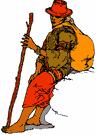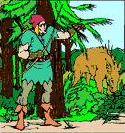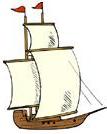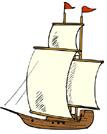St. Julian's Cross

Witchcraft and mass murder - hardly the background of a saint. Yet that is what we discover about the beatified Julian. Here we introduce both the man, and the unusual cross that is associated with him.
by Gerald Harding for seiyaku.com
St. Julian's cross is simply a Cross Crosslet at 45 degrees. It is made from four Latin Crosses arranged at right-angles to each other, with the tops pointing to the 'four corners of the world'. The image of Christianity being spread all around the world is one reason why this cross is sometimes referred to as the Missionary Cross. Another reason is that St. Julian, like St. Christopher and St. Raphael, is a patron saint of travellers. And Julian was indeed a traveller, according to the following famous legend.
As with many legends, there are several versions and this one is from the island of Malta. And because the story is set in a foreign country (France) the Maltese have romanticised it slightly. The Maltese connection? More about that later.
Chapter 1
The Legend - Part I

The story starts in the Loire Valley of France several hundred years ago. Geoffrey and Emma, the Duke and Duchess of Anjou and Maine, had only one child whom they loved dearly. (We'll use his French name: Julien.) This noble family of three journeyed to Le Mans to hold court, one of their ducal duties, where they handed out gifts to the serfs and pardoned a few criminals. The Duke was popular with his subjects so it was a festive day for the town, with bunting-lined streets filled with merry music and medieval mirth.
At just sixteen years old Julien had little involvement in these civilities and went off to play in the woods. Now, 'play' in his case, meant a deer hunt, accompanied by a small infantry of valets and minders. Using his father's horse with its fabulous Arabian-tooled saddle, a bow, a quiver full of arrows, and a mind set on returning with a fine stag for the evening's feast, they set off.
The hunters encircled the woods and slowly entered, shouting and whooping to drive the deer to the centre for the kill. This simple tactic, however, meant that everyone in the group was separated. Not for long of course, but long enough for young Julien to get hopelessly lost. Frightened of being alone in the dark woods, he trotted off to look for his fellow hunters, unwittingly riding further away from them.
After a while, as the bracken thickened, he stopped and listened carefully for sounds of the hunt. But he heard neither dog barking nor horn blowing. Julien was truly lost.

Suddenly, he heard rustling in the undergrowth ahead. He approached with caution, bow loaded and ready to fire. And there, just two metres in front of him, was a beast, crouching under a hedge. Instinctively and without considering whether the critter could be either a danger or a trophy, Julien drew back his bowstring and fired. The arrow pierced the creature in the back, and it screamed in pain. "Hey! Why do you shoot me? I have done you no harm!" (but in French of course). "You have wounded me, and for that I curse you. The next time you meet your parents, you will smite them to death with your sword!"
Another version of the story says that witches secretly jinxed Julien with this curse on the night he was born. The Duke noticed the witches doing this, and years later told his son that he was bedeviled.
That version, however, doesn't explain why the witches found it necessary to cast their evil eye on the baby, nor what would be gained by the son killing his parents. One also has to wonder why the father was spying on witches whilst his wife was giving birth.
Of course, the nasty-witch-curse version is no less credible than a talking beast!
At first, Julian wasn't too troubled by this wild malediction. He loved his parents dearly and would never do them harm. But as the beast slowly died of its wounds, it glared hard at Julien who became frightened that he might indeed be ill-fated.
So Julien decided to move away from his parents and live a life of sadness in self-imposed exile.
At first he rode north to Nantes, Brittany, where a kind innkeeper named Gervais granted him lodging for the night. Julien told the innkeeper his sorry tale, and the tender-hearted Gervais supplied him with food and clothing for his journey. Although he wanted no payment, Julien insisted on giving Gervais his father's fine saddle in return for the innkeeper's charity. The next morning Julien continued on to St. James's shrine at Compostela, to seek redemption and confess his sins to a priest. Not only had he killed a harmless beast, but had also abandoned his parents. The priest gave him the penance that he should go to Rome, which he did forthwith.
Meanwhile, his parents were beside themselves with grief. Their son had gone hunting and did not return. The other huntsmen explained they had searched the woods for hours, but could not find Julien. He must surely have been attacked and devoured by wolves.

Julian sails to Syria
From Rome, Julien went to spend seven years in southern Syria, looking after leprosy sufferers. He met Frankish Hospitallers (from the Rhine) who persuaded him to join the crusaders in fighting the infidel Turks. Julien was a fearless fighter, fearless because he felt his cursed life was worthless and didn't care whether he lived or died. In fact death would release himself of the curse, thereby saving his beloved parents. The Hospitallers, his fighting comrades, were so encouraged by his fighting spirit that their own bravery increased.
This didn't escape the attention of the commander, who decided that Julien should be made a knight. This elevated his spirit further and it wasn't long before he led the Franks in defeating the Turks. The victorious crusaders shared in the great spoils that were to be had, and Julien was a hero. He was respected by all the kings of Europe, the Hospitallers loved him; he had found a purpose in life.
The hospital at Acre received many shiploads of pilgrims on their way to Jerusalem. One such group arrived with the news that the dear Duke of Anjur had died. The story quickly spread and reached Julien. He felt saddened of course, but also relieved that his father's death had not been a result of the curse. The jinx had failed. Surely this meant that his mother would be spared.
With this great news (and a considerable amount of spare cash that went with his privileged status), Julien decided to set sail for home and find his mother.

Julian sails back to France
But not long into the journey there was a terrible storm. The ship was wrecked with great loss of life. Only Julien and four crewmen managed to survive by clinging to flotsam. For three days, they clung to the timbers, without sustenance or sleep. One by one, they perished until only Julien remained. Eventually he drifted to a beach and crawled ashore. Cold and hungry, he found himself once more alone and frightened. He was in absolute poverty; no money, no food, no possessions at all, save his mission to go forth and find his mother, the Duchess.
As a vagabond, he set off on foot for France. Along the road from Saint Jacques to Le Mans, he met a group of French pilgrims near a castle. He talked with them at length; keen to learn of news from his home town. He discovered the Duke was not dead, in fact he was quite healthy, but was living in anguish over his missing son. Julien decided to hasten his journey north, but first felt he should prepare himself, spiritually and physically, before continuing his march. So he accepted the charity of a townsman who took him into his home.
There, he learned of an upcoming battle. The countess of the castle, a young widow named Clarisse, was a Christian and under threat of being kidnapped by an army of Saracens. Always ready for a fight, Julien joined in the fray with vigor and his prior experience as a valiant warrior and knight ensured victory. Once more, he was held in high esteem by all around. It wasn't long before the countess Clarisse heard of Julien's prowess and she demanded he was presented to her.
Her intention was to reward him for his bravery and also retain him as a bodyguard. But it was love at first sight. She could sense that beneath the surface of this tough fighter, there was an equally strong heart that was warm and tender. He was the white knight who had come to rescue a princess in distress. And for Julien, Clarisse was the image of his mother whom he loved dearly. After an appropriate courtship, Julien and Clarisse married.
To avoid upsetting his bride, Julien kept his past a secret and for two years they were happy together.
But then disaster struck.
Back in Le Mans, the Duke and Duchess were holding another court. Coincidentally, Gervais the innkeeper was also in town for the market, and the Duke instantly recognised the Arabian-tooled saddle on Gervais' horse. The Duke ordered his sergeants to seize Gervais for questioning, and the innkeeper told the Duke what had happened. On hearing this, even though twelve years had passed since their son's disappearance, the Duke and Duchess decided to search for him.
After a long and gruelling three-week journey for these two aging gentlefolk, they happened across the fine manor where, unbeknown to them, Julien was now lord. They stayed the night at an inn and embarked in casual conversation with another lodger. They asked about the lord of the manor, and their hearts missed a beat when they heard the name 'Julien'. The next morning they walked to the castle to determine whether it was the same Julien whom they sought.
At the castle entrance, they encountered the chaplain and explained their mission. The chaplain had no doubt that Julien was indeed their lost son, for the Duke's physical appearance was identical. Sadly, on this day though, Julien was not at home. This was unusual because normally he didn't venture far from his new wife. In the past, there had been many suitors for Clarisse and Julien still harboured unfounded jealousy. But today, he was out hunting, so the chaplain took the parents to Clarisse. The countess was delighted to meet them, learning that she had married into another noble family. The three newly-found relatives wept with joy.
Straight away, the countess ordered baths to be prepared for her parents-in-law, and clean clothes, so they would be ready for when Julien returned. He would surely bring back a fine deer that they could all enjoy for a family supper.
The baths were warm and sweet smelling, making the Duke and Duchess feel sleepy. They retired to the countess' darkened bedroom to take a nap together whilst they awaited the arrival of their son.
Julien had finished his hunting and returned home to the castle. Straight away, he searched for his wife, to greet her with a kiss. Nowhere to be found, he assumed she must be taking her regular afternoon sleep. He entered the bedroom, quietly. The windows were covered to keep out the setting sunshine, surely a sign that his wife was in bed, asleep. Yet in the gloom, he saw the outline of not one, but two people in his wife's bed. Having already in his mind that his wife was there, the other outline must surely have been that of a lover!
Julien was filled with rage. For such promiscuous unfaithfulness, she would die by his hand. Her lover too, for they were not worthy to live after such a sin. He drew the sword from his side and with a single blow, slew them both.
Julien left the room, and could not believe his eyes when he saw his wife outside in the corridor. She rushed up to him in glee, to announce that his parents were asleep in bed, not knowing the terrible deed that Julien had just committed.
Julien's scream could be heard all over the town. The beasts of the forest purred.
Some versions of the legend say he was only ten